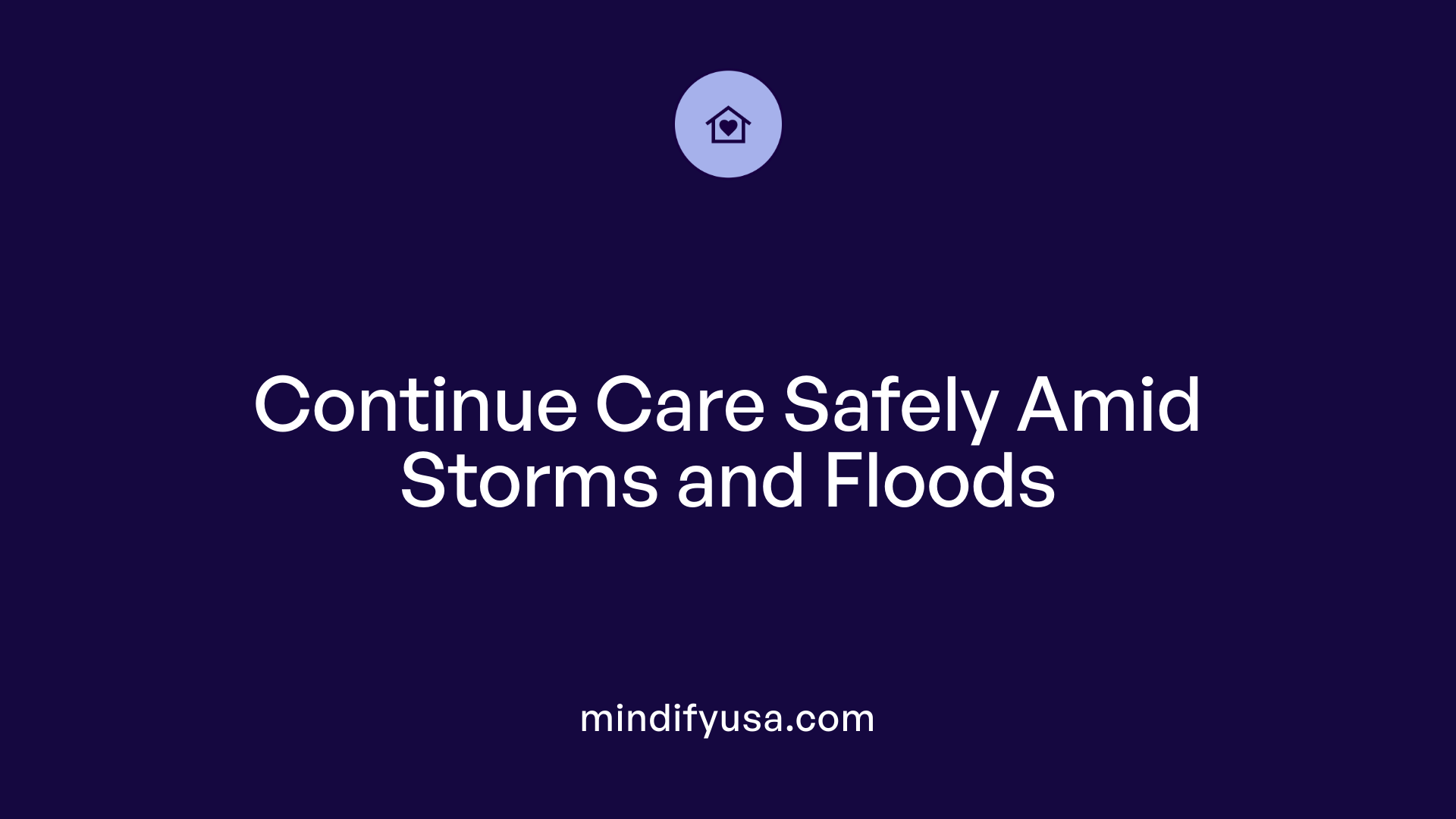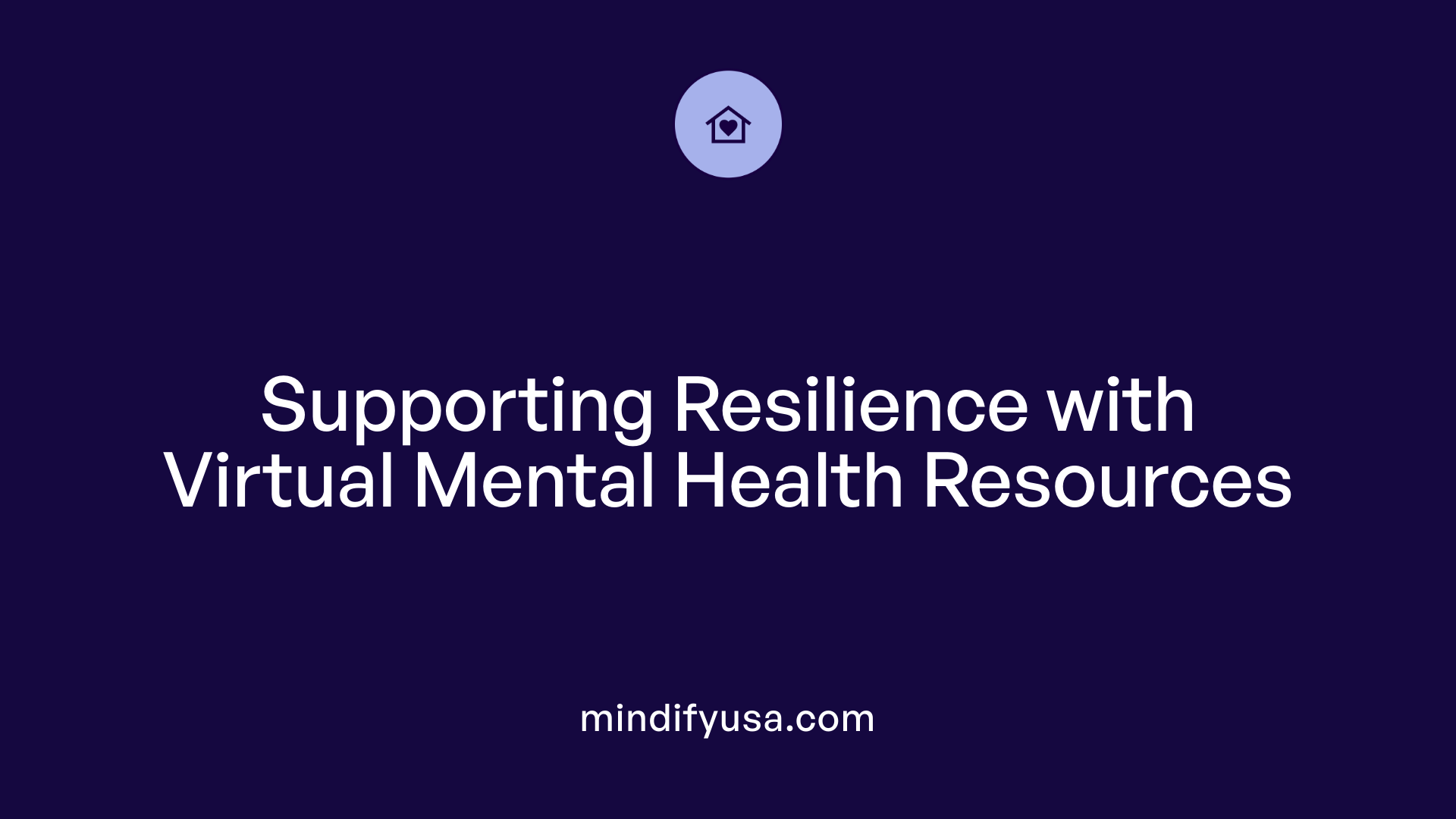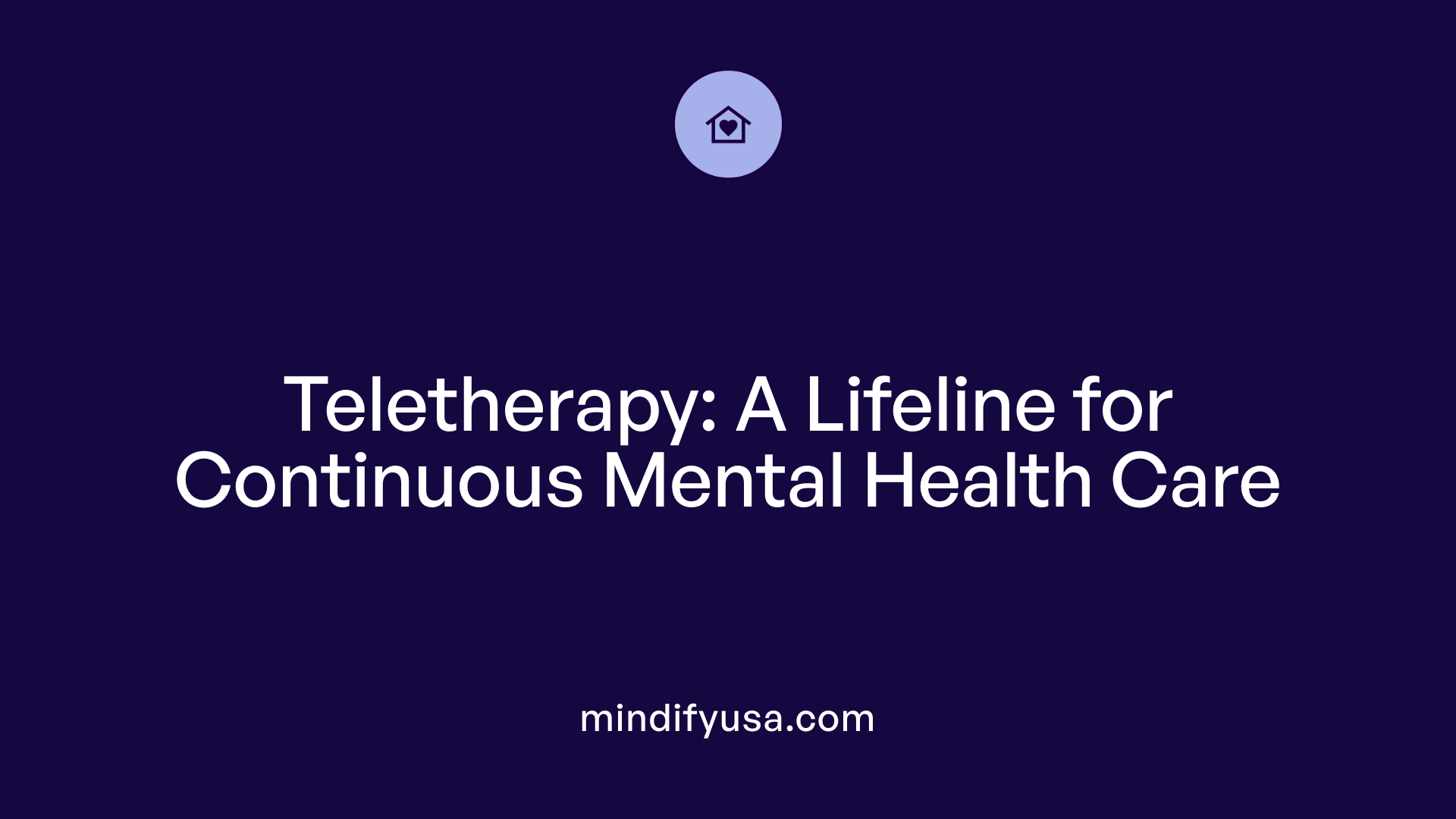The Critical Role of Teletherapy Amidst Weather Crises in New Jersey
Weather emergencies such as hurricanes, snowstorms, and wildfires can severely disrupt traditional healthcare systems, making access to in-person mental health services challenging or unsafe. In response, teletherapy has emerged as a vital tool, especially in states like New Jersey, where weather-related disruptions are frequent and intense. This article explores how teletherapy offers essential benefits during such crises, supported by supportive policies, regulations, and innovative community programs, ensuring that mental health support remains accessible, effective, and consistent regardless of weather conditions.
Advantages of Teletherapy in Weather Emergencies

What are the benefits of teletherapy during weather emergencies?
During weather emergencies, such as hurricanes, snowstorms, or floods, access to in-person mental health services can become difficult or impossible. Teletherapy offers a vital solution by providing support remotely, ensuring individuals continue to receive necessary care despite hazardous conditions. This form of therapy reduces the risk associated with traveling through unsafe environments, allowing clients to maintain their mental health routines.
Moreover, teletherapy helps manage increased stress and anxiety that often accompany weather disasters. It enables mental health providers to deliver timely interventions, which is instrumental in reducing trauma and preventing escalation of mental health issues. Broadly integrated into the existing telemedicine framework, teletherapy ensures the stability of mental health treatment during crises, bolstering overall disaster resilience.
This approach not only supports individual well-being but also enhances community stability during stressful weather events, emphasizing its role in disaster preparedness and response.
How does telehealth support mental health services during weather-related disruptions?
Telehealth is instrumental in maintaining continuum of care during weather-related disruptions. It facilitates remote consultations, therapy sessions, and crisis interventions, even when physical healthcare facilities are inaccessible or damaged. For clients coping with disaster-induced trauma, trauma, or ongoing mental health conditions, telehealth ensures uninterrupted access.
Platforms supporting telepsychiatry enable the management of medication, mental health monitoring, and crisis support networks, effectively bridging gaps caused by infrastructure damage. Especially during disasters like hurricanes or wildfires, video-based platforms allow mental health professionals to reach affected populations, providing immediate relief and long-term support.
This adaptability enhances the resilience of mental health services, ensuring that individuals affected by natural disasters receive continuous, effective care.
Is teletherapy a more accessible and effective option during emergencies compared to in-person care?
Yes, teletherapy proves more accessible and effective during emergencies. It eliminates transportation barriers, making mental health support available to geographically isolated or mobility-challenged individuals. During crises like the COVID-19 pandemic or severe storms, patients can access care from their homes, avoiding travel through dangerous conditions.
The convenience of flexible scheduling and the comfort of familiar environments enhance patient engagement and therapeutic rapport. Research from organizations like the American Psychological Association indicates that teletherapy can yield treatment outcomes comparable to in-person therapy, particularly for conditions such as depression and anxiety.
Furthermore, teletherapy’s capacity to maintain continuity of care amidst disruptions and reduce costs related to travel or missed appointments establishes it as a vital tool during emergencies.
What policies support teletherapy during weather emergencies?
The regulatory landscape in New Jersey has adapted to promote teletherapy amid emergencies. Policies extended through September 30, 2025, now permit all eligible Medicare providers to deliver telehealth services, including behavioral health, using audio-only communication. Geographic restrictions for originating sites are waived, allowing providers to serve patients from any location.
During weather emergencies, waivers enable out-of-state providers to offer services, ensuring rapid response and expanded access. This includes remote monitoring and mental health support for vulnerable populations. Additionally, emergency declarations temporarily facilitate cross-state practice and reduce administrative hurdles.
Overall, these policies reinforce telehealth as an essential component of disaster response, ensuring sustained access to mental health services.
How are telehealth policies implemented and regulated in NJ?
In New Jersey, telehealth and teletherapy are supported by comprehensive regulations that guarantee safety, privacy, and quality of care. Major insurers—including Horizon NJ Health, Medicaid, and private companies—reimburse telehealth services at rates equal to or higher than in-person visits.
All providers must hold valid licensure or certification, with ongoing compliance to state standards. During weather emergencies, temporary policy extensions enable services to be delivered from any location, including audio-only platforms, without compromising reimbursement rates.
State agencies such as the Division of Consumer Affairs oversee these regulations, issuing waivers and facilitating cross-state practice. The overarching goal is to ensure that teletherapy remains accessible, secure, and safe, particularly during times of crisis.
What makes teletherapy particularly useful for specific populations in NJ during storms?
Teletherapy is especially advantageous for vulnerable groups like children, seniors, or individuals with mobility limitations. The YMCA of Greater Monmouth County provides telehealth counseling for children, teens, and adults during COVID-19, ensuring continued emotional and behavioral support despite school closures and social restrictions.
Similarly, Ramapo College’s partnership with Uwill offers free, immediate teletherapy access to students, safeguarding their mental health during campus shutdowns. These programs are designed to be HIPAA and FERPA compliant, ensuring privacy while expanding reach during storms or other disasters.
By enabling therapy delivery through video, phone, or chat, teletherapy reduces barriers such as transportation difficulties or unsafe environments, making mental health support more accessible for those most in need during adverse weather conditions.
How has legislation evolved to support teletherapy during crises?
Legal frameworks in New Jersey and across the United States have evolved significantly during health emergencies like COVID-19. State statutes, such as New Jersey’s public health emergency laws, permit practitioners to offer telehealth without traditional licensing restrictions and allow use of audio-only communication for behavioral health.
Temporary legislative extensions have established reimbursement parity, flexible scheduling, and cross-state practice provisions. These adaptations facilitate rapid deployment of teletherapy, ensuring effective mental health support even when traditional in-person services are unfeasible.
This evolution in legislation underlines the recognition of teletherapy as a reliable and essential healthcare delivery method during crises, promoting sustained access to mental health services during weather emergencies and beyond.
Community Initiatives Supporting Telehealth During Crises

What community programs support teletherapy during weather emergencies?
During severe weather conditions and other crises, telehealth plays a crucial role in maintaining access to mental health services. The YMCA of Greater Monmouth County exemplifies such community programs by providing telehealth counseling for children, teens, and adults. This initiative ensures that individuals continue to receive social-emotional support even when traditional, in-person visits are disrupted. Their virtual mental health offerings include assessments, individual, group, and family therapies, as well as psychiatric services. These services are designed to connect clients with community resources, facilitating continuity of care despite weather-related barriers.
Similarly, Ramapo College of New Jersey has expanded its mental health support by partnering with Uwill, an online platform offering immediate, free access to teletherapy for students. This partnership ensures that students can access mental health services without delays caused by weather events, supporting their emotional well-being during storms or other emergencies.
Both programs utilize secure, HIPAA and FERPA-compliant technologies to uphold privacy standards. They offer various modes of contact, including video calls, phone sessions, and messaging, making mental health support accessible across different circumstances. These initiatives bolster community resilience by ensuring that mental health care remains accessible, flexible, and responsive in times of crisis.
What role do crisis hotlines and emergency supports play?
In addition to scheduled telehealth services, crisis hotlines like the 988 Suicide & Crisis Hotline serve an essential role in emergency mental health support. They operate around the clock to provide urgent intervention, crisis counseling, and immediate referrals, ensuring that individuals experiencing acute distress get prompt assistance regardless of weather conditions.
Community-based emergency services further enhance this safety net by offering support during times when regular telehealth appointments may face disruptions. These hotlines and emergency supports coordinate with telehealth networks to ensure comprehensive coverage, preventing escalation of mental health crises.
The integration of hotlines with ongoing telehealth services creates a robust system capable of addressing diverse needs. Whether a person requires immediate crisis intervention or ongoing therapy, these resources work together to promote safety and recovery, particularly during hazardous environmental events. The combined efforts of community programs and crisis hotlines significantly improve resilience and mental health outcomes during challenging times.
Impact of Teletherapy on Mental Health Care Continuity and Resilience

How does teletherapy support continued mental health care during disruptions?
Teletherapy significantly contributes to maintaining mental health services when disasters or weather emergencies disrupt normal healthcare operations. It offers a flexible, accessible way for clients to continue their treatment without interruption. During events like storms or power outages, teletherapy allows patients to attend therapy sessions, manage medications, and receive crisis support from the safety of their homes.
Research from the American Psychological Association supports that teletherapy delivers care of comparable quality to in-person visits for conditions such as depression and anxiety. This assurance promotes confidence among both providers and patients in remote mental health interventions.
The broad use of real-time, interactive audio-visual platforms ensures that therapists can assess, diagnose, and respond effectively, even in challenging conditions. The ability to use audio-only options expands access during outages or if video technology fails.
In addition to supporting individual treatment, teletherapy enhances community resilience by enabling mental health professionals to deliver timely, ongoing support during environmental crises. This continuous care mitigates the psychological impact of disasters and helps stabilize communities facing adversity.
What are the implications of recent policy changes for future emergency responses?
Legislative updates and policy adaptations have markedly improved the resilience of mental health systems amid emergencies. During the recent public health emergency and weather-related crises, statutes were amended to ensure teletherapy could be delivered without geographical or technological barriers.
Key policy changes include reimbursement parity—where telehealth services are paid at the same rate as in-person care—and the relaxation of licensing restrictions, allowing out-of-state practitioners to serve New Jersey residents via telehealth. These changes facilitate rapid scaling of services during surge periods.
Temporary measures, such as allowing audio-only services and remote service delivery from any location, have proved instrumental in overcoming infrastructural challenges. Such policies reduce delays and ensure continued access to mental health care regardless of physical barriers.
The expansion of telehealth policies underscores its role in disaster preparedness, positioning it as a fundamental part of emergency response strategies. With these policies in place, mental health services can be mobilized swiftly, ensuring communities are supported psychologically amidst increasing environmental uncertainties.
Overview of Telehealth Service Coverage and Regulations in New Jersey
| Aspect | Details | Additional Notes |
|---|---|---|
| Reimbursement | Medicaid, private insurers, and Horizon Blue Cross Blue Shield provide coverage at rates matching in-person services | Eliminates financial barriers during emergencies |
| Service Types | Includes live video, audio-only telehealth, hospital-at-home, psychiatric, behavioral health, and addiction recovery | Supports diverse mental health needs |
| Licensing & Certification | Out-of-state providers can offer services with temporary licenses; practitioners must meet NJ licensing standards | Ensures qualified providers |
| Technologies Used | HIPAA-compliant video platforms, telephones, remote monitoring devices | Emphasizes privacy and security |
| Policy Duration | Extensions valid through July 1, 2026 | Ensures ongoing flexibility |
| Access Points | Available from any location, including client homes and community centers | Facilitates access during disasters |
| Special Provisions | Waivers of facility or site requirements; no cost-sharing obligations | Promotes equitable access |
Broader Impact on Community and Individual Well-being
Telehealth’s role extends beyond individual care to bolster community well-being during crises. Schools like Ramapo College and organizations such as YMCA of Greater Monmouth County have integrated teletherapy into their mental health offerings, ensuring that children, teens, and adults receive support regardless of external obstacles.
The pandemic accelerated these initiatives, with policies encouraging use of telehealth for mental health and addiction services. Virtual platforms provide the added benefit of comfort and convenience, reducing stress and transportation barriers.
For example, Ramapo College’s partnership with Uwill enables students to access free teletherapy sessions, ensuring timely mental health support during COVID-19. The YMCA’s school-based virtual counseling helps mitigate the social-emotional impacts of school closures.
Final Remarks
The evolving telehealth landscape in New Jersey underscores its critical role during weather emergencies and beyond. Enhanced policies, expanded service options, and technological advancements create a resilient mental health infrastructure capable of responding swiftly and effectively to environmental crises.
As these practices become mainstream, they promise a future where quality mental health care is accessible regardless of external disruptions, fostering healthier, more resilient communities ready to face environmental and public health challenges.
For further information, search for "Telehealth policy impact during NJ weather emergencies." This ensures access to authoritative policy guidelines and latest updates on telehealth in New Jersey.
Building Resilient Mental Health Support Systems
The integration of teletherapy into New Jersey’s healthcare framework has demonstrated vital advantages during weather emergencies, offering continuity, accessibility, and effective treatment to those affected by natural disasters. Supported by progressive policies, community programs, and technological innovations, teletherapy ensures that mental health services remain resilient under adverse conditions, helping individuals and communities recover and thrive despite environmental challenges. As weather patterns become more unpredictable, investing and expanding teletherapy infrastructure will be essential in safeguarding the mental health of all residents, emphasizing preparedness, adaptability, and access in the face of future storms and crises.
References
- Telemedicine and Telehealth - Horizon NJ Health
- New Jersey State Telehealth Laws - CCHP
- Department of Human Services | Governor Murphy Announces ...
- [PDF] Telehealth Services During the COVID-19 Pandemic Frequently ...
- Telehealth Services | Good Life Center | Short Hills, NJ 07078
- The Benefits of Teletherapy | Online therapist in New Jersey
- New Jersey - PIP Coverage & Telemedicine - Savoy Associates
- New Jersey - TeleMental Health Training
- YMCA Introduces Telehealth Counseling Support to Strengthen ...






































































































